
Hãy nhập câu hỏi của bạn vào đây, nếu là tài khoản VIP, bạn sẽ được ưu tiên trả lời.


a) -2x+14=0
<=>-2x= - 14
<=>x = 7
Vậy phương trình có tập nghiệm x={7}
b)(4x-10) (x+5)=0
<=>4x-10=0 <=>4x=10 <=>x=5/2
<=>x+5=0 <=>x=-5
Vậy phương trình có tập nghiệm x={5/2;- 5}
c)\(\frac{1-x}{x+1}\) + 3=\(\frac{2x+3}{x+1}\)
ĐKXD: x+1 #0<=>x#-1(# là khác)
\(\frac{1-x}{x+1}\)+3=\(\frac{2x+3}{x+1}\)
<=>\(\frac{1-x}{x+1}\)+\(\frac{3.\left(x+1\right)}{x+1}\)=\(\frac{2x+3}{x+1}\)
<=>\(\frac{1-x}{x+1}\)+\(\frac{3x+3}{x+1}\)=\(\frac{2x+3}{x+1}\)
=>1-x+3x+3=2x+3
<=>-x+3x-2x=-1-3+3
<=>0x = -1 (vô nghiệm)
Vâyj phương trình vô nghiệm
d) 1,2-(x-0,8)=-2(0,9+x)
<=> 1,2-x+0,8=-1,8-2x
<=>-x+2x=-1,2-0,8-1,8
<=>x=-4
Vậy phương trình có tập nghiệm x={-4}

a, ĐKXĐ: \(x\ne\pm1\)
\(\dfrac{x}{x-1}-\dfrac{2x}{x^2-1}=0\)
\(\Leftrightarrow\dfrac{x\left(x+1\right)}{x^2-1}-\dfrac{2x}{x^2-1}=0\)
\(\Rightarrow x^2+x-2x=0\)
\(\Leftrightarrow x^2-x=0\)
\(\Leftrightarrow x\left(x-1\right)=0\)
\(\Leftrightarrow\left[{}\begin{matrix}x=0\\x-1=0\end{matrix}\right.\Leftrightarrow\left[{}\begin{matrix}x=0\left(TMĐK\right)\\x=1\left(KTMĐK\right)\end{matrix}\right.\)
Vậy...........
b, ĐKXĐ: \(x\ne0\) ; \(x\ne2\)
\(\Leftrightarrow\dfrac{x^2-4}{x\left(x-2\right)}-\dfrac{2x+13}{x\left(x-2\right)}=0\)
\(\Rightarrow x^2-4-2x-13=0\)
\(\Leftrightarrow x^2-2x-17=0\)
\(\Leftrightarrow\left(x-1\right)^2-16=0\)
\(\Leftrightarrow\left(x-5\right)\left(x+3\right)=0\)
\(\Leftrightarrow\left[{}\begin{matrix}x-5=0\\x+3=0\end{matrix}\right.\Leftrightarrow\left[{}\begin{matrix}x=5\\x=-3\end{matrix}\right.\left(TMĐK\right)}}\)
Vậy.............
mk làm hơi tắt nha bn

Đáp án D






Suy ra tổng của các nghiệm của phương trình g(x) = 0 là - 3

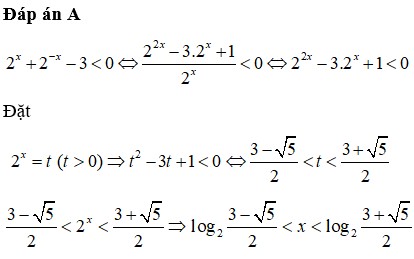
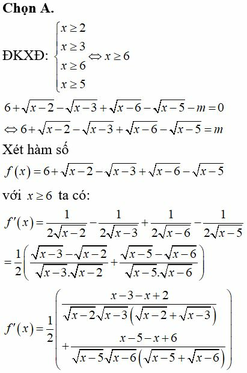
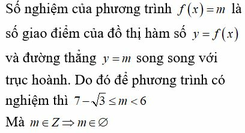

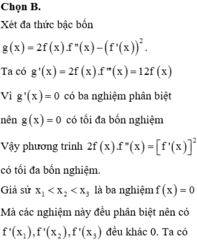

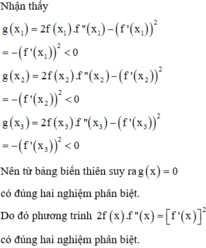
\(x^3+x^2+x^2+x=0\)
\(\Rightarrow x.\left(x^2+2x+1\right)=0\)
TH1: x=0
TH2: \(x^2+2x+1=0\)
\(x^2+2x=-1\)
\(x.\left(x+2\right)=-1\)
Mà \(Ư\left(-1\right)=\left\{-1;1\right\}\)
x<x+2 => x=-1; x+2=1
Ta đều có x=-1
Vậy \(x\in\left\{-1;0\right\}\)
(x^3+x^2)+(x^2+x)=0
<=>x2.(x+1)+x.(x+1)=0
<=>x.(x+1)(x+1)=0
<=>x=0 hoặc x=-1